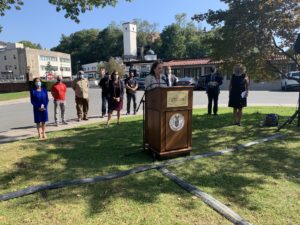Federal aid for Metro-North, MTA, urged at Bronxville event
The president of the Metro-North Railroad traveled to Bronxville yesterday to join local officials at a news conference urging federal help to save the ailing railroad along with the Metropolitan Transportation Authority (MTA).

The MTA operates Metro-North, the Long Island Rail Road, the New York City buses and subways, the Staten Island Railway, two tunnels and seven bridges. Before the pandemic, its network was involved in 2.6 billion passenger trips each year.
Metro-North President Catherine Rinaldi joined state Assemblywoman Amy Paulin, Bronxville Mayor Mary Marvin, labor leaders and transportation advocates near the Bronxville Metro-North train station. They called for Congress and the White House to authorize $12 billion for the MTA to avert railroad service reductions of up to 50%, fare increases, layoffs and the gutting of the MTA”™s capital plan.
The coalition also said there should be at least $32 billion in total emergency aid for public transportation across the country.
“For months we have been calling on the federal government because the magnitude of the Covid-19 financial crisis only gets worse every day,” Rinaldi said. “We can only begin to imagine the long-lasting impacts potential service cuts could have on our region and that”™s why we look to leaders in both red and blue states and urge them to come together to save transit.”
The MTA has been working on a $51.1 billion capital construction plan that would include expanding the New Haven Line service of Metro-North to carry riders into and out of Penn Station. There would be four new stations built in the Bronx.
Metro-North — along with the Long Island Railroad and the other services — are not generating the revenues they were before Covid due to a sharp falloff in ridership. Ridership on Metro-North is still only about 25% of what it was before the pandemic hit, while the number of trains is about 63% of the pre-pandemic schedule.
“Public transportation is our lifeline,” Paulin said. “New York wouldn”™t be New York without it. Residents in Westchester County and right here in Bronxville depend on the Metro-North Railroad every single day.”
Paulin urged the federal government to “keep us riding, don”™t just sit and watch the closing doors.”
Randy Glucksman, chairman of the Metro-North Commuter Council who also sits on the MTA”™s board of directors, said: “Without $12 billion, we”™re facing a doomsday scenario of service cuts, fare hikes and layoffs. We won”™t see the new train cars, station improvements, accessibility projects and signal upgrades that Metro-North Railroad needs and that riders deserve. In the worst-case scenario, West-of-Hudson service could be eliminated, stranding tens of thousands of riders.”
Glucksman said that not having adequate mass transit will force more people into cars.
“The Hudson Valley’s economy and recovery will suffer. It”™s that simple,” Glucksman said. “Metro-North continued to run during the height of the pandemic, getting front line and essential workers where they needed to go, and now the railroad needs a lifeline.”
Marvin said that reliable train service is critically important for residents of her municipality.
“In this time of economic recovery, it is more important than ever that people can get back into New York City to work, go to school, and visit the many cultural institutions that make our area special,” the Bronxville mayor said. “This is impossible without an investment in transit.”
Scarsdale Mayor Mark Samwick warned that if federal funding does not come through to save the MTA, it could take decades to repair the damage to the suburbs and the downstate region as a whole.
Patrick McClellan, policy director for the New York League of Conservation Voters, said that, as a substitute for cars, Metro-North helps keep the New York metropolitan area”™s greenhouse gas emissions substantially lower than they otherwise would be.
“If we are to successfully fight climate change we need more frequent Metro-North service, not the devastating cuts that the MTA will have to make if the federal government lets us down. It”™s past time for Congress and President Trump to act,” McClellan said.
The event took place just hours after President Donald Trump ended Congressional efforts to negotiate a new Covid-19 financial recovery bill — and then reversed himself somewhat by calling for a piecemeal approach to new federal financial aid, including a standalone bill to aid airlines.